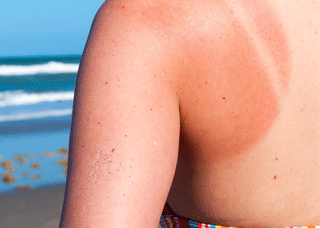Skin Cancer vs Vitamin D Deficiency: What's the right amount of sun?

In small doses, the sun can be good for you. Sunlight is a vital source of vitamin D, which is an essential component in bone health. Low levels of vitamin D are linked to bone disorders including rickets in children and osteoporosis in adults. The vitamin might also protect against heart disease, diabetes, multiple sclerosis and other chronic diseases.
Yet, too much sunlight on our skin causes irreversible sun damage that can lead to skin cancer.
Thirty percent of Australians are vitamin D deficient while two in three Australians will get skin cancer – so where is the balance?
Unfortunately, there is no formula to determine how much sun exposure will safely provide you with enough vitamin D, while also not putting you at risk of cancer. There are too many variables, such as your personal skin type, your location, the time of day, and the weather conditions. No matter your circumstances, though, it’s important not to let your skin redden or burn.
It takes a very short time for our bodies to produce enough vitamin D – less than the time it takes for our skin to redden. Regularly going outside for a few minutes around the middle of the day should be enough. People with lighter skin types may even get enough vitamin D merely from incidental sun exposure throughout the day.
Under strictly controlled conditions, studies show that sunscreen can significantly reduce the production of vitamin D. However, its use in everyday life isn’t thought to result in vitamin D deficiency because sunscreen allows small amounts of the sun’s ultraviolet radiation to reach the skin. People also tend to fail to apply sunscreen at the correct thickness and don’t reapply frequently enough.
Vitamin D is produced faster in our bodies when we have more skin exposed to the sun. However, once the body has produced its maximum level of vitamin D, extra sunlight doesn’t increase production. Lengthy sun exposure can actually break down vitamin D – reducing the benefit while also increasing your risk of skin cancer.
Avoid using a tanning bed, even if you’re trying to escape the sun. Sunbeds increase your risk of skin cancer and are not recommended for enhancing vitamin D levels. Instead, vitamin D can be sourced from supplements or foods like oily fish, which don’t damage the skin or increase your risk of skin cancer.
You can read more about finding the right balance by clicking here.
Getting the right amount of sun is a tough thing to do, and it's very likely you will be over-exposed to the sun's UV radiation at multiple times throughout the year. Your risk of skin cancer increases every time you get sunburnt, so it's important to see your doctor annually for a professional skin check.
- Tags:
- Risks
